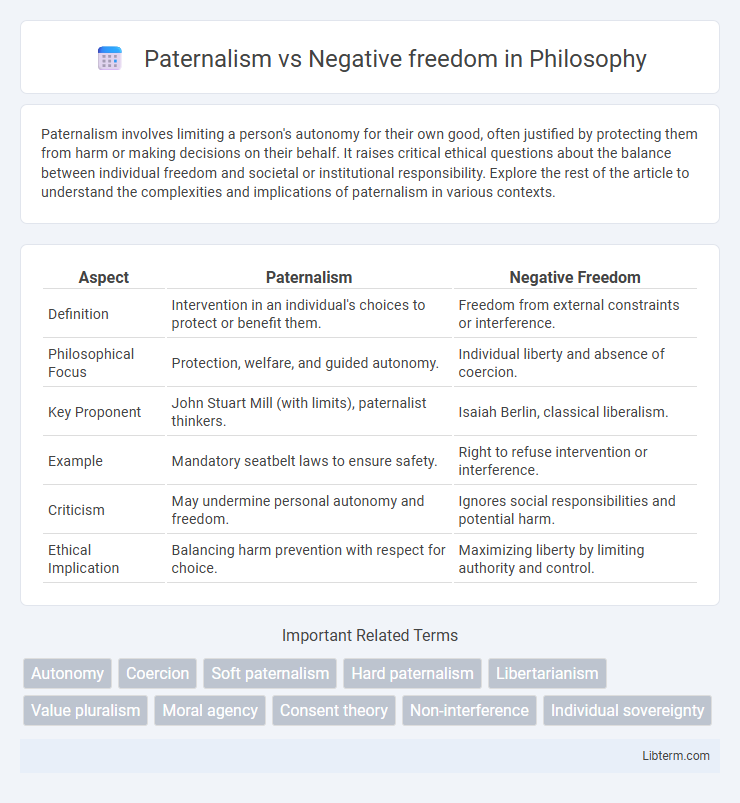Paternalism involves limiting a person's autonomy for their own good, often justified by protecting them from harm or making decisions on their behalf. It raises critical ethical questions about the balance between individual freedom and societal or institutional responsibility. Explore the rest of the article to understand the complexities and implications of paternalism in various contexts.
Table of Comparison
| Aspect | Paternalism | Negative Freedom |
|---|---|---|
| Definition | Intervention in an individual's choices to protect or benefit them. | Freedom from external constraints or interference. |
| Philosophical Focus | Protection, welfare, and guided autonomy. | Individual liberty and absence of coercion. |
| Key Proponent | John Stuart Mill (with limits), paternalist thinkers. | Isaiah Berlin, classical liberalism. |
| Example | Mandatory seatbelt laws to ensure safety. | Right to refuse intervention or interference. |
| Criticism | May undermine personal autonomy and freedom. | Ignores social responsibilities and potential harm. |
| Ethical Implication | Balancing harm prevention with respect for choice. | Maximizing liberty by limiting authority and control. |
Understanding Paternalism: Definition and Origins
Paternalism refers to the practice or policy of limiting individuals' freedom or autonomy for their own good, often justified by the belief that the authority knows better than the individual. Its origins trace back to legal and ethical doctrines where protecting individuals from self-harm or poor decisions was deemed necessary, reflecting a power dynamic similar to that of a parent-child relationship. This concept contrasts sharply with negative freedom, which emphasizes non-interference and the absence of constraints on individual actions.
Negative Freedom: Core Concepts and Principles
Negative freedom centers on the absence of external constraints, allowing individuals to act according to their own will without interference. It emphasizes personal autonomy, where freedom is defined as the nonexistence of obstacles, barriers, or coercion imposed by others. This concept underpins liberal political theory, advocating that true liberty requires minimal state intervention and protection of individual rights.
Historical Perspectives on Freedom and Authority
Historical perspectives on freedom and authority reveal the tension between paternalism, where the state limits individual freedom for their own good, and negative freedom, which emphasizes freedom from interference by others. Philosophers like John Stuart Mill argued against paternalism, advocating that individuals should have autonomy unless their actions harm others, representing the foundation of negative liberty. Throughout history, debates on authority often revolve around balancing societal control with protecting personal freedoms, shaping modern governance and legal frameworks.
Philosophical Foundations: Mill, Berlin, and Beyond
Philosophical foundations of paternalism and negative freedom center on John Stuart Mill's harm principle, which emphasizes individual autonomy and limits state intervention to prevent harm to others. Isaiah Berlin's distinction between negative freedom, defined as freedom from interference, and positive freedom, involving self-mastery or paternalistic guidance, deepens the debate by highlighting the tension between individual liberty and state-imposed welfare. Contemporary discussions extend these theories, exploring the balance between protecting personal choice and justifying paternalistic actions in liberal democracies.
Paternalism in Modern Democracies
Paternalism in modern democracies involves government interventions designed to protect individuals from self-harm, often through regulations like mandatory seatbelt laws or drug restrictions. This approach prioritizes collective well-being and public health over absolute individual autonomy, challenging the concept of negative freedom, which emphasizes freedom from interference. Debates around paternalism highlight tensions between state responsibility and personal liberty, with critics arguing that excessive paternalism can undermine democratic principles by restricting individual choice.
Negative Freedom in Contemporary Society
Negative freedom, defined as the absence of external constraints or interference, remains a cornerstone in contemporary society's emphasis on individual autonomy and personal rights. Modern legal frameworks and democratic institutions prioritize safeguarding citizens from unwarranted state intervention, reflecting the value placed on privacy, freedom of speech, and economic liberty. Debates about public health measures, surveillance, and digital data control underscore the ongoing tension between preserving negative freedom and pursuing collective welfare.
Case Studies: Public Health, Law, and Personal Autonomy
Case studies in public health reveal paternalism when governments impose vaccinations or quarantine measures to protect community health despite individual resistance, highlighting clashes with negative freedom that champions non-interference. Legal decisions frequently balance paternalistic laws regulating substance use, such as drug prohibition, against individual rights to self-determination and freedom from coercion. Personal autonomy debates surface in scenarios like mandatory helmet laws or seatbelt regulations, where the state's interest in safety conflicts with individual liberty to choose risk exposure.
Ethical Dilemmas: When Does Protection Become Control?
Paternalism raises ethical dilemmas by prioritizing protection that can easily slip into control, undermining individual autonomy and freedom. Negative freedom emphasizes the absence of external constraints, challenging paternalistic interventions that restrict choices "for one's own good." Balancing these tensions requires careful consideration of when protective actions cross the threshold from beneficence to coercion, impacting rights and moral agency.
The Balance: Finding Middle Ground Between Freedom and Intervention
Balancing paternalism and negative freedom requires nuanced governance that protects individuals while respecting autonomy, especially in contexts like public health and safety regulations. Regulatory frameworks that implement minimal, targeted interventions can prevent harm without unduly restricting personal liberties, ensuring a middle ground between excessive control and absolute freedom. Empirical studies suggest that transparent policies and participatory decision-making enhance public acceptance, optimizing the trade-off between freedom and societal welfare.
The Future of Paternalism and Negative Freedom
The future of paternalism and negative freedom hinges on balancing individual autonomy with protective interventions, especially in areas like public health, digital privacy, and AI regulation. Emerging technologies and complex social challenges demand adaptive frameworks that respect negative freedom while justifying paternalistic actions to prevent harm. Innovative policy models and ethical guidelines will shape how societies reconcile these competing values, ensuring individual rights align with collective well-being.
Paternalism Infographic

 libterm.com
libterm.com